The RDAMNC Ignite Mini’s 2025 event took place in the last week of February, uniting community leaders and industry experts across three locations on the Mid North Coast: Coffs Harbour, Valla Beach, and Port Macquarie.
Our third Ignite Mini event was hosted at Charles Sturt University (CSU) Port Macquarie, which had the largest turnout of the three conferences with 50 attendees gathering together within the Innovation Hub. Our Coffs Harbour and Valla Beach events brought 43 attendees to the local Coffs Harbour Surf Club and Valla Beach Woolshed.
The event witnessed a meaningful turnout, with a diverse range of participants, from community leaders to industry specialists, all coming together to explore and address key topics crucial to regional growth and development.
Key Insights from the Event
Madeleine Lawler, CEO of RDAMNC, set the stage for the event highlighting several ongoing initiatives and key areas of focus for the Mid North Coast region:
- Finalising MNC Skills Audit
- Manufacturing industry support
- Early Childhood Education and Care
- Business Innovation Support
- Regional Plan
- The Welcome Experience
Additionally, Lawler provided insight into RDAMNC’s project that have taken place on Norfolk Island:
- Cattle Assisted Reproduction Program
- Country University Centre Norfolk Island
- Sheep Assisted Reproduction Program
- Food System Mapping
- Made in Norfolk Island Branding
The emphasis was placed on fostering a holistic approach to regional development, with a particular focus on ensuring that the Mid North Coast is equipped with the skills and infrastructure needed to thrive in the modern economy.
Dr. Lawler also presented a discussion on the significance of the Mid North Coast Skills Audit for fostering regional development. The audit included mixed-method data collection that analysed approximately 250 participants’ feedback across the region.
- Focus Groups: conducting discussions with community and industry stakeholders
- Desktop Research: reviewing existing data and reports
- Surveys: gathering information for local businesses and organisations
The MNC Skills Audit identified drastic shortages in healthcare, education, construction, hospitality, and emerging technical fields such as cybersecurity, which can be partly attributed to several development barriers, including:
- Housing Affordability
- Childcare Availability
- Transport Infrastructure
- Digital Connectivity

Dr. Lawler identified an overarching takeaway of the Skills Audit is the need to “develop local talent” by creating clearer career pathways for young people “hopeful for a successful career and future close to home” and mature aged people “inspired by a pre-retirement career transition”, strengthen the connections between education providers and employers, expand work experience programs, and support traineeships and apprenticeships in the Mid North Coast region.
The Skills Audit also emphasised the importance of local initiatives being delivered to bridge the gaps in the training, skills and workplace systems. The team at RDAMNC will be working with the stakeholders in region to understand what the opportunities are for exploring better local integration.
Although these hurdles may seem too complicated to climb, they can be overcome if local stakeholders, councils/councillors, local MPs, and community groups coordinated their approaches via cross-sector strategies for addressing common challenges. Additionally, regional coordination of training and development initiatives via collective advocacy for infrastructure needs is a valuable method of problem solving that RDAMNC is dedicated in supporting now and in future.
Learning the Macleay: a catalyst for regional growth
Jo-Anne Kelly, from Learning the Macleay, shared her insights on the ongoing regional initiatives aimed at empowering youth and enhancing career opportunities in the area. The Stronger Places, Stronger People (SPSP)program, an Australian Government initiative, is focused on disrupting disadvantage in communities, aiming to demonstrate that place-based collective efforts can lead to improved outcomes for children and families. Kempsey, which is the third most disadvantaged Local Government Area (LGA) in New South Wales, has been a focal point for the initiative.
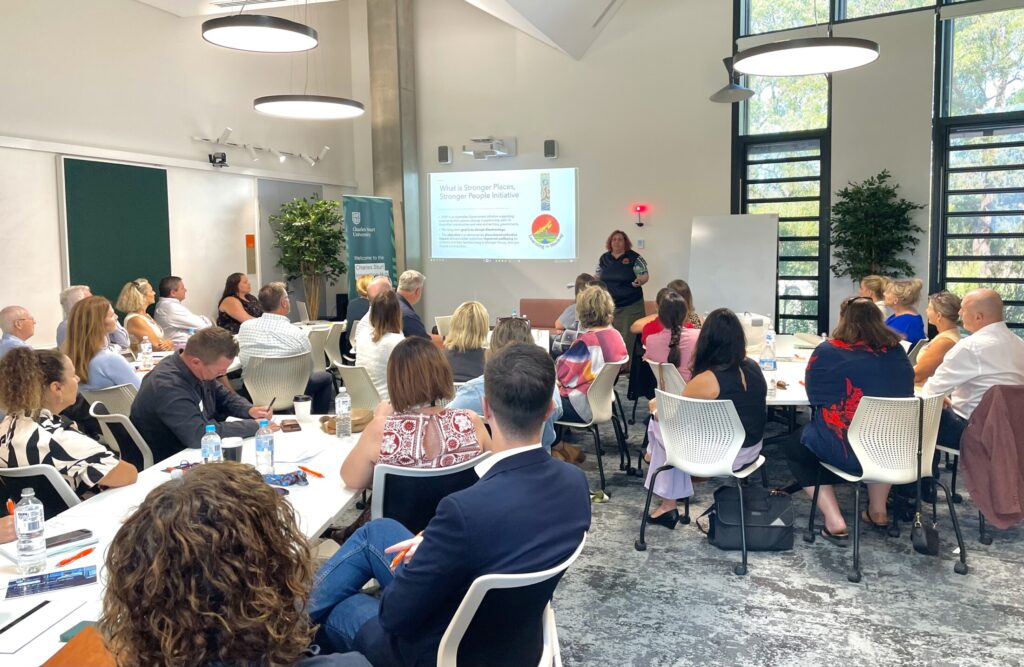
Key focus areas identified for the region include:
- Assist education and justice paradigms for children and young people in the Macleay Valley
- Addressing racism and improving relationships
- Supporting youth engagement through activities and career programs
Learning the Macleay has been on a fast-tracked journey over the past two years, collaborating with the Kempsey community to facilitate desired and effective change by data collecting and curating new information and comparing with previously reported community consultation outcomes.
- Individual Conversations
- Large Groups
- Set Up Groups
- Documentation
- Partnership Lead
- Community Reference Table
- Backbone Team
- Action Groups
- Cross Sector Group
“Yuwa Nyinda is a concept that was derived from conversations with young people about how do we give them the ability to dream again?”
The Yuwa Nyinda Dream Academy, held on August 28 and 29, 2024, at Chappel Park in Kempsey, provided an invaluable opportunity for the youth of the Macleay Valley to explore a wide range of educational and career pathways. Learning the Macleay and Dhina Durriti Aboriginal Corporation collaborated the design of Yuwa Nyinda (Yes, You) to inspire and motivate young people; the event connected them with career and training providers, such as:
- Charles Sturt University
- Aboriginal Employment Strategy (AES)
- NSW Fire and Rescue
- Country University Centre
- Enterprise and Training Company (ETC)
- NSW Police Force
- Billabong Zoo Koala and Wildlife Park
- Tafe NSW
- Macleay Valley Theatre Company Inc.
- And more!
With many young people in the region facing personal and social challenges, the academy aimed to reignite their ability to dream about a positive future. The event encouraged the message that “You can’t be it if you can’t see it,” helping students visualise their potential and empowering them to pursue a variety of career paths.
Over 2000 students attended, engaging with a diverse group of exhibitors and organisations that showcased opportunities in various industries. In addition to the career guidance, the event provided students with practical advice from local role models who shared their personal journeys and success stories. This direct connection with professionals was crucial in helping students understand the pathways available to them and the steps they could take to achieve their goals. The event heavily incorporated the arts community, allowing students the opportunity to express themselves through cultural dance and song, while also providing youth and the wider community to celebrate live musical, theatrical and comedic performances.
Learning the Macleay sustains itself with three core pillars that aim to heal, educate and align their organisation and the Kempsey community as one healthy, forward functioning, ecosystem. This embracement of community driven outcomes is no more relevant then with the overwhelming success of the Yuwa Nyinda Dream Academy 2024 which has been annexed in 2025 to the Yuwa Nyinda Youth Summit transforming the career and educational opportunity of youth in the Macleay Valley across 16 primary and secondary schools.
The Welcome Experience: Supporting Essential Workers on the Mid North Coast
Penny Davidson and Helen Mansfield, representing Boambee East Community Centre and RDAMNC, recently presented The Welcome Experience, an initiative designed to enhance the integration of essential workers across the Mid North Coast. The program assists with relocation, housing, education, social connections, employment, healthcare, and access to leisure and recreation, ensuring a smooth transition for essential workers and their families.
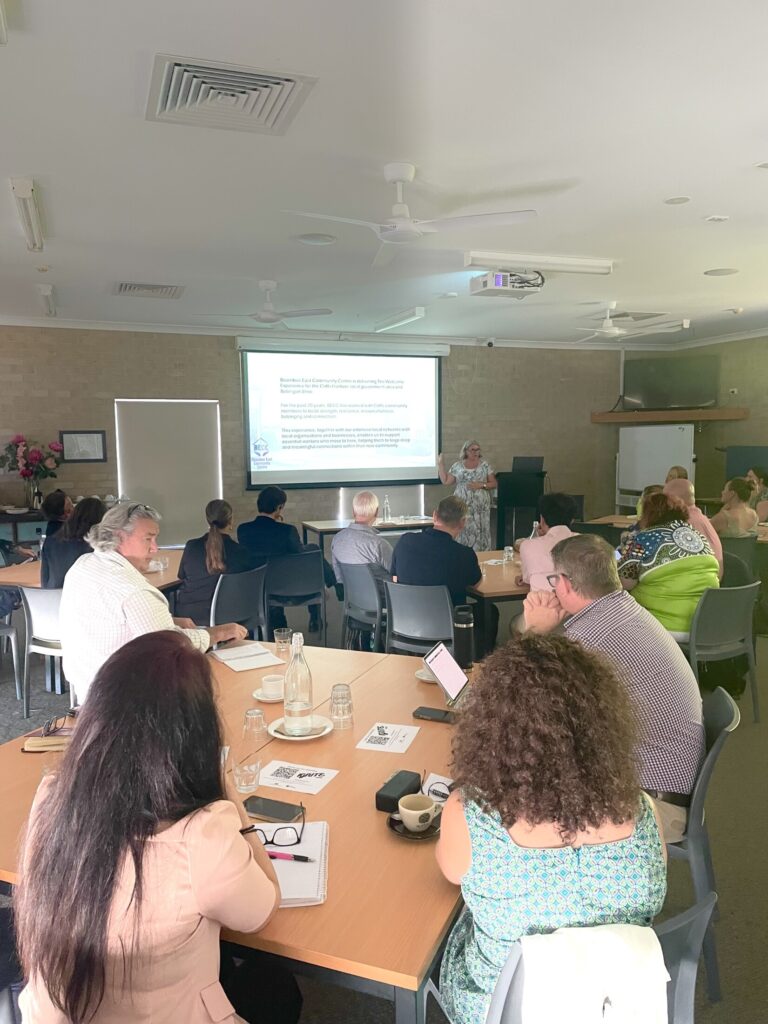
The focus is on improving the overall liveability and well-being of those in frontline services, such as health, aged care, early childhood education, education, veterinary services, Rural Fire Service, Police Force, fire and rescue, corrective services, ambulance, as well as communities and justice, fostering strong connections between essential workers, their families, and the broader community, the initiative aims to build a sustainable workforce while enriching the communities they serve.
Key areas of support include:
- Leisure, recreation, and cultural connections
- Relocation assistance
- Housing solutions
- Education and childcare options
- Social connections and community integration
- Employment opportunities and healthcare access
Since its launch, The Welcome Experience has seen significant success in recruiting healthcare professionals, particularly within aged care facilities, hospitals, and allied health centres. This increase in healthcare staff has led to notable improvements in patient care and service delivery across the region.
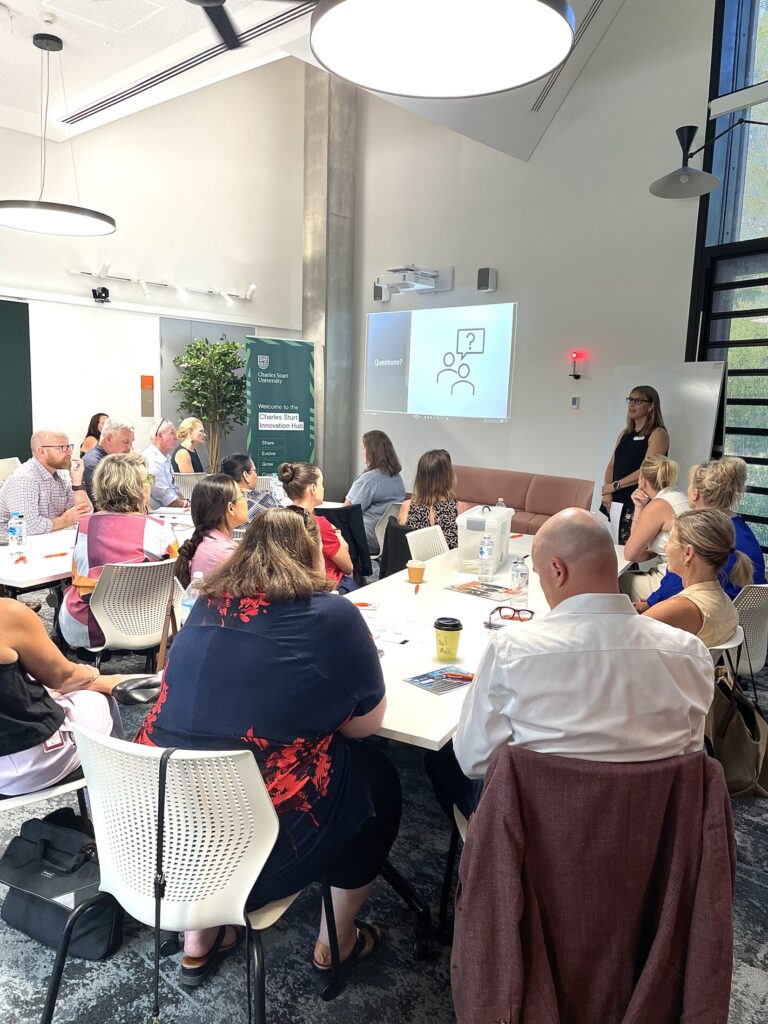
“The Welcome Experience is about more than just improving the lives of those who relocate here. For me, the bigger picture is that we are enhancing and growing our region, helping it reach its full potential as the most liveable area in NSW.” – Helen Mansfield.
Despite challenges such as housing shortages, childcare availability, and limited public transport, the program has made a tangible impact. As the program continues to grow, it aims to strengthen the Mid North Coast’s workforce, ensuring a steady supply of essential workers and contributing to the region’s long-term prosperity.
Supporting Local Entrepreneurs: Alt Collective’s Impact on Small Businesses
Courtney Tune, representing Alt Collective, recently shared how the organisation is empowering local entrepreneurs and small businesses at the Ignite Mini events. Alt Collective’s Regional Innovation Program has been a catalyst for business growth, offering tailored support to help refine strategies, prepare for investment, and scale operations.

Alt Collective goes beyond conventional advice; they actively engage with participants, helping them realise their goals and providing practical pathways to achieve them. One standout offering is Business, Bikes, Beers—a unique three-day program combining expert business teachings with world-class mountain biking. It allows participants to reflect on their business, connect with like-minded entrepreneurs, and develop a 12-month plan. The focus is on building long-term client relationships, boosting brand loyalty, and mastering the art of closing deals.
Alt Collective’s 2024 programs are designed to foster innovation and entrepreneurship through mentorship, industry support, and investor connections. With a “no two projects are the same” approach, the organisation is helping entrepreneurs build stronger, more sustainable businesses.
By continuing to support local business owners and creatives, Alt Collective is playing a crucial role in growing a vibrant and resilient entrepreneurial community across the region.
Technological Innovation and Sustainability in Agriculture: Shaping the Future of Farming
The recent Ignite Mini event in Coffs Harbour shed light on the critical role of technological innovation in agriculture, with industry leaders such as Rob King from Costa Group providing invaluable insights. Costa Group, a leader in the agricultural sector, manages over 7,200 hectares of farmland, including state-of-the-art glasshouses and berry-growing facilities both locally and internationally.

King highlighted Costa’s pioneering approach to embracing new technologies, which not only boost crop yields but also drive sustainability and help the industry adapt to climate change.
Key innovations discussed during the event included:
- The introduction of robotic transporters, designed to improve safety and efficiency while reducing operational costs.
- The adoption of protected cropping techniques and substrate-based growing methods, which have significantly increased production yields, particularly in Far North Queensland.
- The integration of solar energy, with solar panels now powering irrigation pumps and other critical farm operations, reducing reliance on traditional energy sources.
Costa’s commitment to environmental sustainability was evident in their ongoing efforts to incorporate advanced technologies that meet the demands of modern agriculture while minimising their environmental footprint. These forward-thinking innovations are not only enhancing farming practices but also setting new benchmarks for sustainability in the industry. By embracing technological solutions, Costa Group is helping to shape a more resilient and sustainable future for agriculture, ensuring the long-term viability of farming and the health of the planet.
Worker’s Compensation and Workplace Safety
Andrew Hollier, Strategic Industry Manager at iCare NSW, recently provided valuable insights into the evolving landscape of workers’ compensation and workplace claims in New South Wales during a presentation at the Ignite Mini event. Hollier’s presentation addressed the critical differences between small employers and larger enterprises, particularly focusing on premium rates, claims experience, and the varying levels of support available to each.
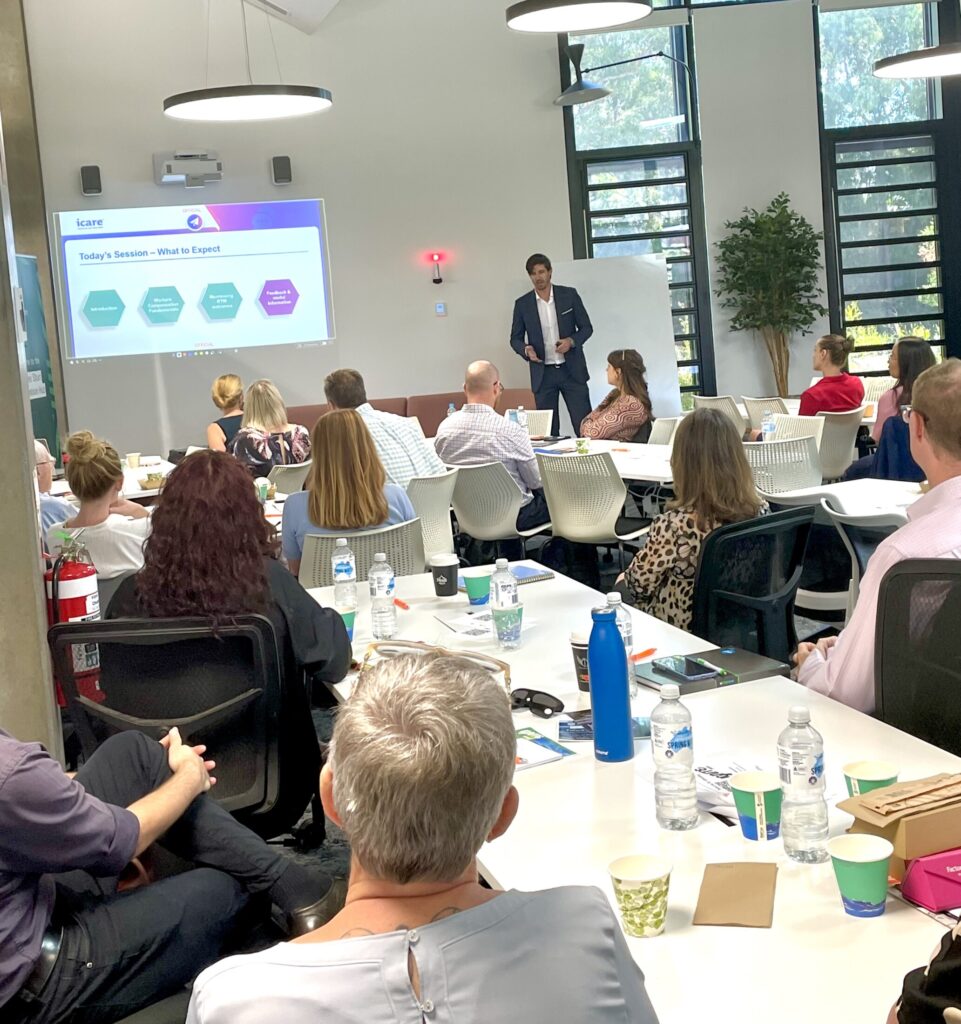
A key takeaway from Hollier’s presentation was the emphasis on early injury reporting. He stressed that reporting injuries as soon as they occur can significantly improve the management of claims and the overall outcome for both the employer and the employee. Hollier also highlighted the importance of offering suitable work options to injured employees as part of a return-to-work plan. This approach not only aids recovery but also reduces the financial impact on businesses by ensuring that employees remain productive, even in a modified capacity.
Another crucial point discussed was the indirect costs associated with workplace injuries, including lost productivity and the potential reputational damage that can arise from inefficient claims management. Poor handling of claims can tarnish a company’s reputation, making it harder to attract top talent and potentially leading to higher premiums.
This session served as an essential resource for understanding the complexities of workers’ compensation and how businesses can streamline their claims processes while supporting injured employees more effectively.
Circular Economy and Waste Management
The conference also featured a comprehensive segment on the Circular Economy, led by Ash Sambrooks, from the Department of Primary Industries and Regional Development. The growing importance of circular economy practices in waste management was a key topic of discussion, with speakers outlining the significant opportunities for businesses and communities in New South Wales to capitalise on the transition to a more sustainable and circular approach to resource management.
Ash Sambrooks provided an overview of waste statistics in New South Wales, noting that the state generates more waste than any other in Australia. With projections for waste production to nearly double by 2041, the need for effective waste management strategies is more urgent than ever. The Circular Economy model, which focuses on minimising waste and maximising resource efficiency, is central to addressing these challenges. By adopting circular principles, businesses can reduce their environmental impact and create new opportunities for growth.
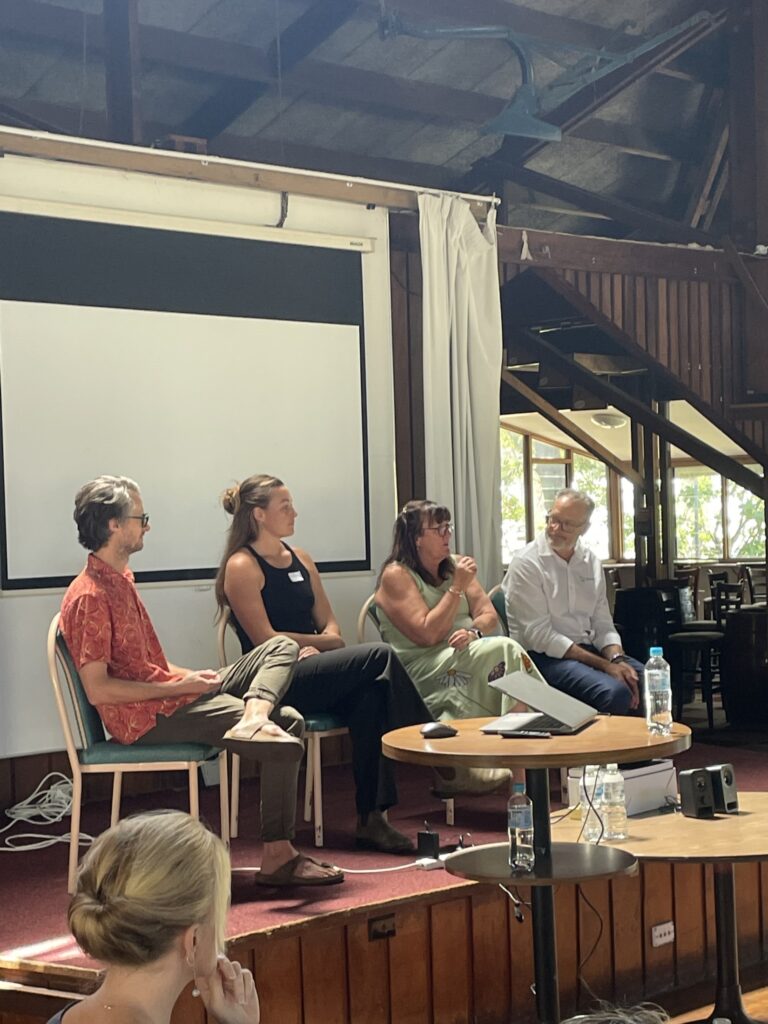
Photo taken at Ignite Mini, hosted at Valla Beach’s, Woolshed.
Speakers in order of seating:
- Left: Ash Sambrooks
- Left Centre: Lilli King
- Right Centre: Liz Jeremy
- Right: Graham Knowles
Liz Jeremy from Concatenation, specifically strategies for designing out waste, extending product lifecycles through reuse and repair, and supporting natural ecosystem regeneration. Jeremy’s work highlights the critical role that circular economy principles play in reducing emissions and improving the resilience of regional infrastructure, particularly in light of the growing challenges posed by extreme weather events.
The Norfolk Wave initiative, led by Lilli King, was another key example of circular economy success, located in Norfolk Island. The program focuses on reducing waste, increasing recycling rates, and empowering local communities to embrace sustainable practices. Over the past four years, The Norfolk Wave has managed to recycle glass into four different grades of sand, create carbon for use in plastic recycling, hot rot composting for community gardens and food production, and processing plastic using Resin8 aggregate for use in concrete. Through partnerships with the Norfolk Island Regional Council, Revolve Your World, Terra-Cycle, E-Thread and Eenee Designs, the initiative has made significant strides in improving recycling rates, with the aim of reaching an 80% recycling rate by 2025.
Graham Knowles presented a detailed plan for the development of a Regional Circular and Manufacturing Precinct at Kundle Kundle, which will serve as a hub for circular economy activities in the region. iQ Renew aims to leverage rail infrastructure to reduce carbon pollution from truck transport and enhance waste processing efficiency. By bringing together key stakeholders, including local councils, businesses, and government agencies, the precinct promises to create jobs, foster innovation, and help the region transition to a more sustainable economy.
Unlocking the Secrets of Bush Tucker: Connecting with Local Flavours and Nature
The Bush Tucker Shack, a local small business committed to sustainability, hosted an enriching experience that explored the diverse world of locally sourced flora and fauna, focusing on their traditional and modern uses in cooking. Attendees had the opportunity to taste freshly gathered lilly pillys, bush plums, finger limes, and Bunya nuts.
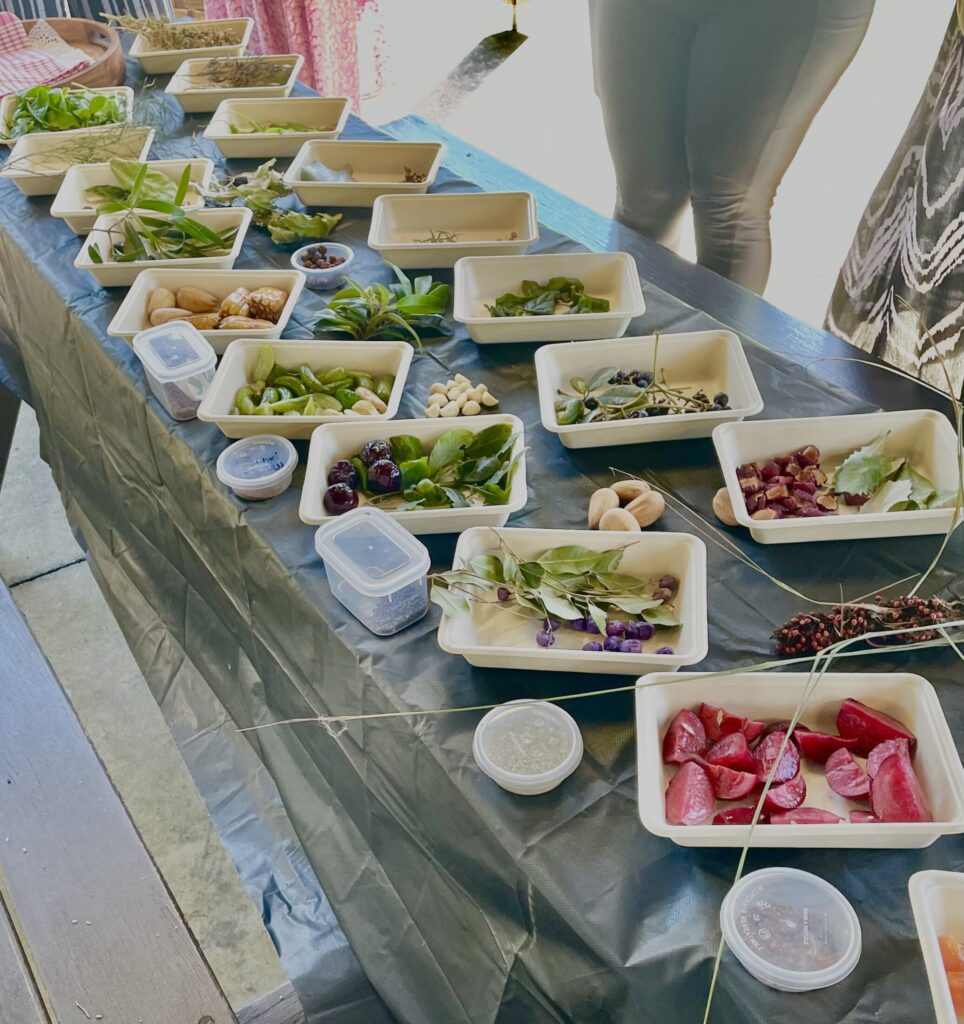
This session highlighted the value of understanding and utilising locally sourced, sustainable ingredients. By incorporating bush tucker into both traditional and modern culinary practices, businesses can support local ecosystems, and create unique, marketable products. This knowledge offers a strategic advantage to businesses looking to tap into the growing demand for sustainable and native Australian ingredients.
The Ignite Mini’s 2025 event was a resounding success, with each speaker providing valuable insights into the future of regional development, sustainability, and innovation. From technological advancements in agriculture to the growing importance of circular economy practices, the event showcased the incredible potential of the Mid North Coast region to lead the way in creating sustainable, thriving communities. The collaboration between industry leaders, government agencies, and local communities will continue to drive progress in the years ahead, ensuring that the region remains a beacon of innovation and resilience in the face of future challenges.
Updated: 10/03/2025

Regional Development Australia Mid North Coast’s industry and community event, Ignite Mini 2025, is returning to the Mid North Coast! The Ignite Minis are in-person events, designed to provide the MNC community an opportunity for consultation on the priority areas of the RIF and other key aspects for our region.
Over the last week of February 2025, the RDAMNC team will be hosting three events across three different locations:
- Surf Club, Coffs Harbour (Monday 24th, February 2025)
- Woolshed, Valla Beach Tourist Park (Wednesday 26th, February 2025)
- Charles Sturt University, Port Macquarie (Friday 28th, February 2025)
The change in locations from previous years provides equal opportunities for the diverse Mid North Coast community to attend, host, and participate in Ignite Mini 2025. Industry and community speakers and event agendas to be announced late November.
Click the link to secure your FREE ticket!